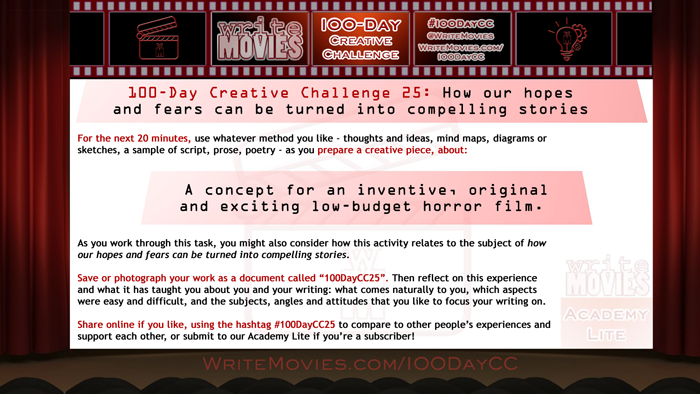
by John | Aug 10, 2020 | Horror Award, Movie Reviews and TV Reviews
We’re celebrating our Horror Award with articles about our favorite films and TV shows in horror. Find out what scares us the most… and what we’re looking for from a horror script! First up: A QUIET PLACE… (more…)

by John | May 28, 2020 | 100-Day Creative Challenge
Welcome to the twenty-fifth of our Creative Challenges. WriteMovies’ 100-Day Creative Challenge 25 is about how our hopes and fears can be turned into compelling stories.

(more…)

by John | Jan 24, 2020 | Our Winners
The winner of our Horror Award 2019 was also the Grand Prize Winner of our Fall 2019 Screenwriting Contest: MONGER by David Axe!
Having already introduced it here, we thought we’d get a more in-depth look at the project with a Q&A with David…
To find out what inspired the project, how he went about writing it, and his advice for writers, take a look below. And if you’d like to give yourself a chance to follow in his footsteps and win our Grand Prize of $2000, enter our Winter 2020 Screenwriting Contest by March 1st!
What was your inspiration for writing MONGER?
I borrowed from my own experiences. I was a war correspondent for many years and spent time with combat troops in several war zones. In 2011 I was riding in a U.S. Army vehicle in Logar province in Afghanistan when a bomb exploded underneath it. I was fine but many of the soldiers in the vehicle were not. More generally, I’m no stranger to trauma, guilt and alcoholism. I wanted to write about these things while also giving them substance. As in, a monster.
Why did you choose to write a horror movie?
Horror stretches the rules of everyday life, allowing a writer to play in a much wider space than, say, a strictly naturalistic drama would do. I wanted to give form to guilt. I wanted my characters to literally fight a monster that embodies their worst trauma. Hence horror.
What was the writing process, and how long did it take?
I write steadily, from beginning to end, over a period of a couple of months. Once I’ve got a solid first draft, I get some notes from readers I trust. In the case of MONGER, I hosted a table read that was very helpful. Then revisions lasting a few weeks. The whole process of writing MONGER took maybe four months.
How have your own experiences as a filmmaker informed your writing?
I’ve made a few indie features, most recently LECTION. The more I direct, the more I simplify my writing. As a director, I want a very clean script with clear conflict and strong characters. The texture and nuance come from performance, photography and production design. The writing should be a robust, strong framework. In other words, the director in me wants the writer in me to not overthink it.
What would be your advice to other screenwriters?
Write like it’s your job and you’re going to die soon, which you are. Get used to rejection and being ignored. Don’t be shy about showing your work. Be humble when people offer notes but also learn to smile and nod and ignore bad notes. Try everything you can think of to con someone, anyone, into producing your script. And if no one will shoot your script, consider doing it yourself. At the very least, you’ll learn a lot. Then sit down and write another one. And another. And another.

by John | Jan 10, 2020 | Our Winners
In a good year for horror here at WriteMovies, the 3rd Place Script is a classic haunted house story. With a gripping plot and a fantastic lead character, HAVENWOOD by Jai Brandon gave us all the spooks, thrills, and excitement we could have possibly hoped for!
(more…)

by John | Dec 28, 2019 | WriteMovies News
It’s been a great year for us here at WriteMovies, with three successful contests – Winter, Spring, and Fall – producing a lot of great scripts! We’ve also been very proud of our first two genre awards to celebrate great writing: the Sci-Fi and Fantasy Award and the Horror Award.
We’re already hard at work with our winners on developing their scripts and getting them out there to the industry, but today we look back at our contests and reveal our full Wall of Fame for 2019.

Here’s a reminder of our Grand Prize winning scripts…
- PROMISE OF TOMORROW by Andrew Pennington: A fantastic British rom-com that made us laugh out loud from start to finish, capturing our attention with its quirky characters, heartwarming story, and fantastic audience appeal.
- CARAVAGGIO by Alasdair McMullan: Based on the tempestuous life of the Italian painter, this television pilot was as fun as it was fascinating, making the most of its strong concept and engaging main character.
- MONGER by David Axe: The winner of our Horror Award also took the Grand Prize in the Fall Contest. The plot and the monster that haunts the protagonists both feel fresh, and with well-rounded characters we quickly came to care about, it kept the suspense high throughout.
And a special shout out to the first ever winner of our Sci-Fi and Fantasy Award, too: THE TIME-TRAP by Mark Flood! To describe this script as a thrilling ride would be an understatement; it kept us gripped from the first page to the last.
If you’d like the chance to see your name on next year’s wall, submit to our Winter 2020 Contest and Rom-Com Award today – just one week until the Standard Deadline!

by John | Dec 19, 2019 | Writing Insights
Every year without fail, there’s a question that I can’t seem to answer. To this day, it remains one of the biggest unsolved mysteries in the world of cinema: is THE NIGHTMARE BEFORE CHRISTMAS a Halloween film or a Christmas film?
To some, it’s obvious. “It’s both, isn’t it?” they say. This stop-motion animated classic (usually associated with Tim Burton, although actually directed by Henry Selick) tells the story of Jack Skellington, Pumpkin King of Halloween Town, who grows bored of his usual holiday and decides to take over Christmas instead – so of course it’s both.
I’ll admit that this answer may be right, but it doesn’t help because it doesn’t tell me when I should be watching the film. Do I watch it at Halloween or Christmas, or at some strange midpoint on November 27th? Which set of celebrations should it be a part of?
This year felt like the year to try to resolve the issue. With WriteMovies running our first ever Horror Award and announcing the winner on Halloween, we’ve read lots of scripts and watched lots of films that made us think about the Pumpkin King’s holiday, whether they be scary and violent or more light-hearted like THE NIGHTMARE BEFORE CHRISTMAS.
And after some thought, I think I’ve finally figured it out. I think I’ve finally found an answer to the question…
Because I genuinely believe now that it’s a Christmas film.
Even writing that out now, it still looks strange to see. After all, this is the film that still, 25 years since it’s release, is most emblematic of Tim Burton’s visual style – a style that has been embraced by goths, outcasts, and lovers of the weird and spooky ever since.
It’s a film which has a skeleton as its main character, which opens on shots of ghosts and pumpkins, and which sees Santa Claus (or “Sandy Claws”, as the residents of Halloween Town call him) kidnapped by a misbehaving gang of trick-or-treaters. To call it a Christmas film therefore sounds strange even to my own ears.
But I’ve decided that it is – because thematically, it shares much more with Christmas films than anything else. Fundamentally, it’s the message a film conveys that determines where it belongs. Christmas films generally have a focus on family and community, and THE NIGHTMARE BEFORE CHRISTMAS is just the same.
After all his (mis)adventures, at the end of the film Jack comes to realize the folly of his mistakes. By turning his back on his friends and the town that loves him, disaster has followed. It’s only by returning to where he belongs, embracing his community, and accepting the love of the ragdoll Sally that he finds happiness again.
Nobody would ever accuse THE NIGHTMARE BEFORE CHRISTMAS of being a horror film, but I believe this shows that it’s not even a Halloween film either. It belongs firmly to the realm of Christmas, and that’s why I’ll be watching it as part of my holiday celebrations this year.
Of course, give it another twelve months… and I’ll probably change my mind again.
From all of us here at WriteMovies, a very Merry Christmas. Oh, and I supposed a Happy (belated) Halloween, too!








